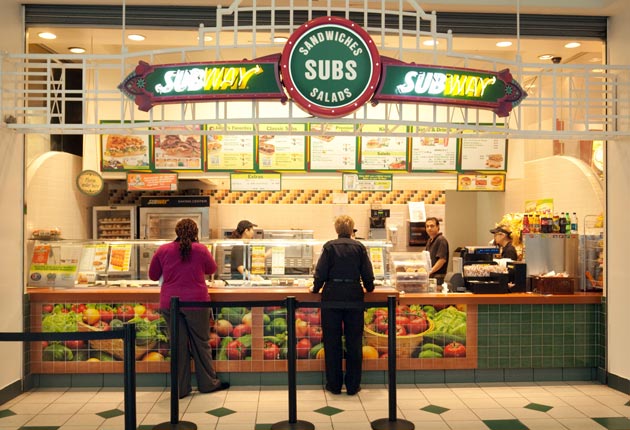The sandwich that ate McDonald's
Subway, the US chain with a big appetite for expansion, is putting the crunch on fast food's proudest name, by David Usborne

Encircling the globe one over-stuffed and slightly soggy foot-long sandwich at a time, Subway has confirmed what some of us had probably begun to suspect: it has grown into the largest fast-food chain in the world, surpassing even its burger-flipping rival McDonald's and easily dwarfing Burger King.
With an "Eat Fresh" advertising slogan, the US-based chain has now established baloney'n'bacon beachheads in 95 countries. At the last count, there were 33,749 of them compared to 32,737 McDonald's restaurants. Burger King reported last year having just over 12,000 outlets in 73 countries. Britain alone has 1,350 Subway shops and in China, a 200th branch will soon open.
"Unbelievable," was the response yesterday from the company's co-founder, Fred DeLuca, who was just a 17-year-old wanting to generate extra cash to pay for university when he opened his first sandwich shop in Bridgewater, Connecticut, in 1965 with $1,000 loaned by a friend, Peter Buck, who became his business partner.
Catching up with the mighty McDonald's was hardly on his mind at the time. But he and Mr Buck did have a business plan of sorts: to open 32 new Subways over the next 10 years in the north-eastern United States. Four and a half decades later – and 27 years after the opening of a Subway shop in Bahrain that marked the chain's first foray overseas – they have achieved growth rate that has been more than 1,000 times faster.
In Sweden to attend the opening of a new Stockholm Subway, Mr De Luca, now 63 and listed on the latest Forbes billionaires list as the 692nd richest man in the world, is not gloating about overtaking the famed golden arches of McDonald's, for years considered the ultimate symbol of American commercial imperialism.
"We've been big beneficiaries of McDonald's," Mr De Luca told the AFP news agency. "I would say if McDonald's never existed, we would have had fewer stores than we have. They've gone to so many places and gotten people into the habit of going out to eat on a regular basis and that opens the door for us to grow." The ingredients of Subway's success are varied. The chain operates an almost pure franchisee model, where local entrepreneurs open and manage their own branches. They can hire and fire as they please and set opening hours, and in return for paying fees, everything else is seen to by headquarters, including marketing and setting menu choices.
Subway has also earned a reputation for opening up in unorthodox places, such as the US Air Base in Bagram in Afghanistan, a church in Buffalo, a riverboat in Germany and an aluminium smelting plant in New Zealand. Subways nowadays are common in air terminals, petrol station convenience outlets and even the occasional pet-shop. If you cannot spot it, open your nostrils. One of the more dubious gifts from Subway to humanity is the toxic aroma of their part-baked breads browning themselves in the on-site ovens.
Nothing symbolises the chain's appetite for daring – or at least for free publicity – than the decision last year to attach a Subway shop to the scaffolding of One World Trade, the new skyscraper under construction at Ground Zero in Manhattan. As the structure grows towards its eventual zenith of 105 floors, so the Subway, built inside a pod that is really a shipping container, will rise, supplying sub sandwiches to steelworkers who otherwise would have to make the trip back to earth for sustenance.
The chain has benefited also from the growing health consciousness of consumers. For years, its marketing drive has been the freshness of its offerings. In Britain, it tries to underscore a commitment to healthy eating, sponsoring the TV show The Biggest Loser and partnering with organisations such as Heart Research UK.
The notion that the chain's sandwich offerings, such as its Veggie Delight, are better for you is compelling enough to keep Vito Scarola, a fashion casting director in Manhattan going back. "It doesn't have a deep-fryer," he says. "Sure, it's still fast food but I like the idea there are more readily available options to eat fresh."
Of course, just how healthy Subway makes you will depend on the nature of your grazing. The selection process – all those different breads to choose from, including honey oat or Italian herb, aas well as myriad cold-cuts and cheeses – could itself consume a few mental calories at least. And while a 6in Veggie Delight on nine-grain wheat cannot be too bad for you, the foot-long steak and cheese is hard to resist, as is the Marinara, with its sloppy meatballs. With those sorts of choices, the world may be eating more hearty than fresh with newly dominant Subway.
Join our commenting forum
Join thought-provoking conversations, follow other Independent readers and see their replies
Comments
Bookmark popover
Removed from bookmarks